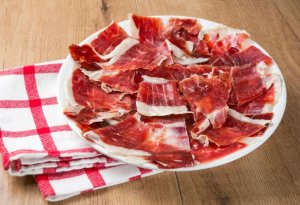Benefits of Having Serrano Ham For Breakfast

Diet is a subject that worries athletes the most. Eating healthily is essential when it comes to taking care of our health, staying fit and to get all of the nutrients that our body needs. We have discovered an aid for this, and we want to tell you about it: the benefits of having serrano ham for breakfast.
Serrano ham is a part of the so-called ‘Mediterranean diet‘ and although many people consider it to be a healthy food, others are skeptical and believe that it contains more fat than our bodies need. Well, it’s been proven that having serrano ham for breakfast brings amazing health benefits, and we are going to tell you about them.
Eating serrano ham for breakfast, why would you do that?
If any athletes have stopped eating serrano ham, it is due to the myths that surround this food. As we mentioned before, people have not only said that is has too much fat, they’ve also said that it isn’t beneficial for cardiovascular health. Well, we are going to debunk this by making a list to convince you of the reasons why eating serrano ham for breakfast is beneficial.
It has few calories
Calories are a very concerning topic for athletes. Their intention is to have the necessary calories to perform the sport they practice, since a calorie surplus, would cause them to gain unwanted weight. Well, this fear may be completely wrong, since serrano ham only has 250 calories, per 100 grams of product.

It is rich in fatty acids
It has a high content of monounsaturated fatty acids and doesn’t contain saturated fats, in some cases, a percentage that is so low it doesn’t even deserve to be mentioned. In fact, it’s said that, after olive oil, serrano ham is the main source of oleic acid.
A great source of proteins
Surely this was one of the subtitles that caught your attention the most? We know that proteins are an essential part of your daily diet, and by including Serrano ham in your breakfast will provide you with a large quantity of them. To give you an idea, for every 100 grams of product, you will consume 43 grams of protein. Protein is incredibly important, not only for energy contribution, but for muscle development.
A source of vitamins
Finding a product capable of bringing you the different nutrients that your body needs, especially in athletes who experience huge physical wear, seems a complicated task. Well, ham is one of them. That’s why, eating serrano ham should be a part of your sport routine.
Ham contains a large amount of vitamin B and D. Vitamin B is in charge of turning food into energy and it helps to keep the nervous, cardiovascular and immune system functioning correctly. It’s also great for preserving mental health.
Vitamin D is responsible for protecting bone health, by preventing your body from losing calcium.
It’s a minerals source
In addition to all of the above, minerals are also present in this food. Having serrano ham in your daily breakfast can provide you with the minerals necessary for your body, such as zinc, magnesium, iron and phosphorus.

It helps to control cholesterol
As we said before, after olive oil, serrano ham is the most recognized source of oleic acid, which plays a very important role in cholesterol control.
It helps to combat stress
Elite athletes sometimes suffer from stress because of the competitions they have to perform. Others, although they don’t reach those levels, can feel stress due to their daily life rhythm.
No matter what kind of athlete you are, the truth is that stress and depression are the order of the day. Well, having serrano ham for breakfast also helps with this. Its high vitamin B1 content prevents you from falling into any dark mental places.
It helps with concentration
We all know that minerals are important for mental health. Zinc, which is found in large quantities in ham, is one of them. In fact, Zinc is in charge of helping us concentrate, pay attention and keep information in our memory.
Have we given you enough reasons to start eating serrano ham? Being informed about the foods that are beneficial to our health and that help us to practice sports, is essential for every athlete.
Diet is a subject that worries athletes the most. Eating healthily is essential when it comes to taking care of our health, staying fit and to get all of the nutrients that our body needs. We have discovered an aid for this, and we want to tell you about it: the benefits of having serrano ham for breakfast.
Serrano ham is a part of the so-called ‘Mediterranean diet‘ and although many people consider it to be a healthy food, others are skeptical and believe that it contains more fat than our bodies need. Well, it’s been proven that having serrano ham for breakfast brings amazing health benefits, and we are going to tell you about them.
Eating serrano ham for breakfast, why would you do that?
If any athletes have stopped eating serrano ham, it is due to the myths that surround this food. As we mentioned before, people have not only said that is has too much fat, they’ve also said that it isn’t beneficial for cardiovascular health. Well, we are going to debunk this by making a list to convince you of the reasons why eating serrano ham for breakfast is beneficial.
It has few calories
Calories are a very concerning topic for athletes. Their intention is to have the necessary calories to perform the sport they practice, since a calorie surplus, would cause them to gain unwanted weight. Well, this fear may be completely wrong, since serrano ham only has 250 calories, per 100 grams of product.

It is rich in fatty acids
It has a high content of monounsaturated fatty acids and doesn’t contain saturated fats, in some cases, a percentage that is so low it doesn’t even deserve to be mentioned. In fact, it’s said that, after olive oil, serrano ham is the main source of oleic acid.
A great source of proteins
Surely this was one of the subtitles that caught your attention the most? We know that proteins are an essential part of your daily diet, and by including Serrano ham in your breakfast will provide you with a large quantity of them. To give you an idea, for every 100 grams of product, you will consume 43 grams of protein. Protein is incredibly important, not only for energy contribution, but for muscle development.
A source of vitamins
Finding a product capable of bringing you the different nutrients that your body needs, especially in athletes who experience huge physical wear, seems a complicated task. Well, ham is one of them. That’s why, eating serrano ham should be a part of your sport routine.
Ham contains a large amount of vitamin B and D. Vitamin B is in charge of turning food into energy and it helps to keep the nervous, cardiovascular and immune system functioning correctly. It’s also great for preserving mental health.
Vitamin D is responsible for protecting bone health, by preventing your body from losing calcium.
It’s a minerals source
In addition to all of the above, minerals are also present in this food. Having serrano ham in your daily breakfast can provide you with the minerals necessary for your body, such as zinc, magnesium, iron and phosphorus.

It helps to control cholesterol
As we said before, after olive oil, serrano ham is the most recognized source of oleic acid, which plays a very important role in cholesterol control.
It helps to combat stress
Elite athletes sometimes suffer from stress because of the competitions they have to perform. Others, although they don’t reach those levels, can feel stress due to their daily life rhythm.
No matter what kind of athlete you are, the truth is that stress and depression are the order of the day. Well, having serrano ham for breakfast also helps with this. Its high vitamin B1 content prevents you from falling into any dark mental places.
It helps with concentration
We all know that minerals are important for mental health. Zinc, which is found in large quantities in ham, is one of them. In fact, Zinc is in charge of helping us concentrate, pay attention and keep information in our memory.
Have we given you enough reasons to start eating serrano ham? Being informed about the foods that are beneficial to our health and that help us to practice sports, is essential for every athlete.
All cited sources were thoroughly reviewed by our team to ensure their quality, reliability, currency, and validity. The bibliography of this article was considered reliable and of academic or scientific accuracy.
- Aguilera, C. M., Ramírez Tortosa, M. C., Mesa, & Gil, Á. (2001). Efectos protectores de los ácidos grasos monoinsaturados y poliinsaturados sobre el desarrollo de la enfermedad cardiovascular. Nutr. hosp, 78–91. https://pesquisa.bvsalud.org/portal/resource/pt/ibc-9498
- Celdrán de Haro, Francisco Miguel. (2017). Efecto del jamón serrano sobre determinados factores de riesgo cardiovascular. Universidad Católica San Antonio de Murcia. http://hdl.handle.net/10952/2675
- Fundación Española de Nutrición (FEN). La alimentación española. 2ª Edición. https://www.fen.org.es/storage/app/media/imgPublicaciones/2018/libro-la-alimentacion-espanola.pdf
- Gratal, G. (2017). Proyecto de inversión de importación de jamón Ibérico de la marca La Dehesa del Clavín (Tesis de licenciatura). Repositorio de la Universidad Privada del Norte. Recuperado de http://hdl.handle.net/11537/13066
- Ventanas, J & Ruiz Carrascal, Jorge & Antequera, Teresa & Martín, L & Garcia, Cris & Tejeda, Juan & Cava, Ramón. (1997). Características de la materia prima y del producto que determinan la calidad del jamón Ibérico: composición de la grasa. Eurocarne. 62. 35-42
- Zamora, José, Velásquez, Alvaro, Troncoso, Ledia, Barra, Patricia, Guajardo, Karen, & Castillo-Duran, Carlos. (2011). Zinc en la terapia del síndrome de déficit de atención e hiperactividad en niños: Un estudio controlado aleatorio preliminar. Archivos Latinoamericanos de Nutrición, 61(3), 242-246. Recuperado en 10 de diciembre de 2022, de http://ve.scielo.org/scielo.php?script=sci_arttext&pid=S0004-06222011000300002&lng=es&tlng=es.
This text is provided for informational purposes only and does not replace consultation with a professional. If in doubt, consult your specialist.








